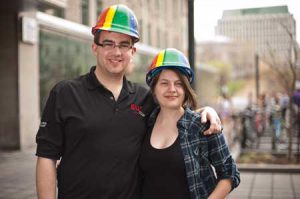
By Katherine Gombay
Josh Redel and Amelia Garmaise are co-leaders of an organization that is quietly reversing some age-old stereotypes about engineers. Redel created Queer Engineer in the fall of 2010 for all of the queer students who might not be quite as relaxed about being ‘out’ in the Faculty of Engineering as he is.
“There are a lot of old stereotypes about engineers that can overwhelm certain people and make them feel uncomfortable about who they are because of sexual identity,” says Redel, who is also the President of the Engineering Undergraduate Society (EUS) and the newly elected President of the Students’ Society of McGill University (SSMU). “Each faculty has its own stereotype and people think that the engineers are a conservative all-guys club, and even though it’s becoming less and less true, the idea is still around.”
Every Thursday, Queer Engineer holds a social gathering which offers queer engineering students what Garmaise describes as ‘a safe space’ to come and hang out and talk with others from the Faculty.
“Engineers like to be with their own. There’s a strong sense of community,” says Garmaise, who adds that while she hasn’t run across any overt homophobia, “there’s a lot of gender policing that’s subtle but it’s there, like the expectation of a particular kind of masculine behaviour.”
Redel adds that Queer Engineer may be especially important because, “…engineers are often shyer than people in faculties like Arts. They’re here for a hard-core education, it’s a professional degree with a lot of work and a lot of times they’re not very open socially.”
So far, in addition to the weekly social gatherings, Queer Engineer has also held two Blues Pubs and several group outings to Montreal’s Gay Village, among other events. These events typically draw 50 to 60 people. In the past, they’ve also held an information session with a presentation by the Career Planning Service (CaPS) about being out in industry. While companies like Google, IBM and Microsoft have set up queer committees, Redel says that this is unfortunately much less common among engineering firms. And though neither Garmaise nor Redel are particularly worried about being out in the working world, they both acknowledge that it may be challenging for some queer engineering grads to work in a place where the majority of the employees are older straight men.
In the meantime, until they graduate, Queer Engineer offers a welcoming space for queer engineering students. And Garmaise foresees that there will always be a need for this kind of organization, no matter how much the behaviour of engineering students changes as old stereotypes give way.
“I think people always seek out their own a bit – even if people in the straight community are friendly and pro LGBTQ – it’s good to have friends who are like you,” says Garmaise. “There’s a really strong sense of community among queer engineers at McGill right now, and I’d like to think that organizations like Queer Engineer will always be around and be part of that.”
